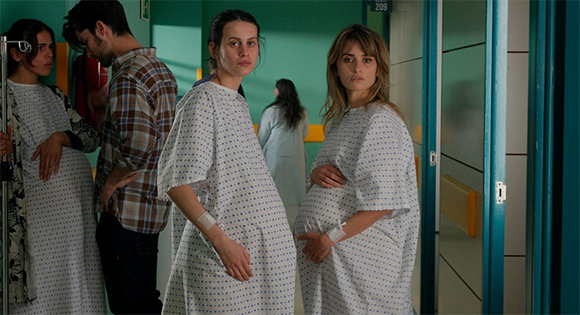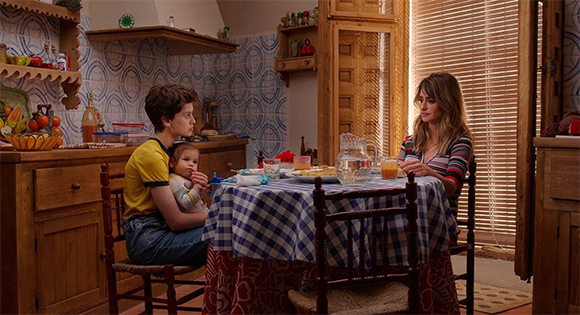On its surface, Pedro Almodóvar’s latest creation Parallel Mothers shines with all of the elements that fans expect of this endlessly inventive artist: gorgeous colors, stellar performances from women, moments of shock, and sly humor. The fact that, beneath all this beauty, Parallel Mothers also contains layers of disorienting depth reveals that Almódovar is not only eager to challenge himself but also willing to challenge his audience. Here he draws attention not only to the ways that secrets and lies cause interpersonal trauma but also to the intergenerational trauma that haunts a country with many secrets and lies buried in its history.
Photographer Maria Janis Martinez Moreno (Penélope Cruz) is first seen digging deep. She’s trying to find the unmarked mass grave that holds her great-great-grandfather and others who were murdered and inhumed by a Franco-associated death squad during the Spanish Civil War. All over Spain, such graves lie just beneath the surface, though it seems that many would like to forget this fact. Janis and her family, like so many descendants of those murdered, just want to give her great-great-grandfather a proper burial. She has some names of those who might be buried with him, but she doesn’t have much else, especially in the form of any kind of help from the bureaucracies who might point her in the right direction.
Luckily, a break comes in the form of Arturo (Israel Elejalde), a forensic entomologist whose work examining victims’ remains aids the Association for the Recovery of Historical Memory. He not only agrees to push his colleagues to support Janis’s journey but the two also begin an affair. Soon, a pregnancy surprises them both, especially since Janis is of an age when motherhood seems unlikely. Arturo’s disbelieving response offends Janis and she dismisses him, committing to raise the child on her own, refusing to get a paternity test, and forbidding Arturo from being in their lives.

Nine months later, Janis winds up sharing a maternity ward room with Ana Manso (Milena Smit), an unhappily pregnant teen. The two strike up a bond, Janis serving as a gentle mothering presence to the frightened Ana, even as Ana’s biological actress mother, Teresa (Aitana Sánchez-Gijón), watches benignly from the sidelines, and remarkably, Janis’s and Ana’s daughters are born on the same day. Upon meeting Janis’ newborn, Arturo’s disbelief regarding whether the child is actually his offends her and she dismisses him, committing to raise the child on her own and refusing to get a paternity test. In the wake of this painful parting, Janis’ and Ana’s parallel lives unfurl into smart, surprising soap opera tendrils that twist, turn, and eventually intersect again, revealing devastating secrets and unearthing hard truths.
If this all sounds like a lot for one film, it is, in the most inspiring, Almodóvarian way. The plot is so intricately laced, the characters so carefully connected (including a characteristically delightful turn from Almodóvar regular Rossy de Palma), the melodramatic conventions so perfectly balanced with affecting ingenuity, that it is near impossible to describe the remainder of Parallel Mothers without completely confusing the reader or robbing this masterpiece of its unique power to burrow beneath the audience’s skin.
This is a passionately political work, but it is most deeply interested in people themselves. The bloody hands of a fascistic government that disappeared countless human beings might cast an undeniable pall over the proceedings, but it is the complicated connections between the human lives touched by such tragedy that gives the film its beating heart. In a country where so many families have been torn apart, new forms of family must be fostered. Almodóvar threads compounding permutations of motherhood and other buds of relationship throughout. The film rewards repeated viewings with countless overlapping layers through which its characters and audiences are invited to embrace the kind of authentic accountability and openness to evolution that fascism fears and so desperately wants to deny.

Eventually, the dug-up pain of the past reenters Janis’s present and Parallel Mothers circles back to the buried bodies that haunt its opening moments. By the time this return occurs, bold trails of truth have been blazed. Scars may be inescapable but they need not be suffered and shouldered on one’s own. Parallel Mothers suggests that, in a world so packed with collective and individual pain, our most revolutionarily healing acts of accountability might be reaching out and remaining open to honestly excavating and attending our wounds together.
